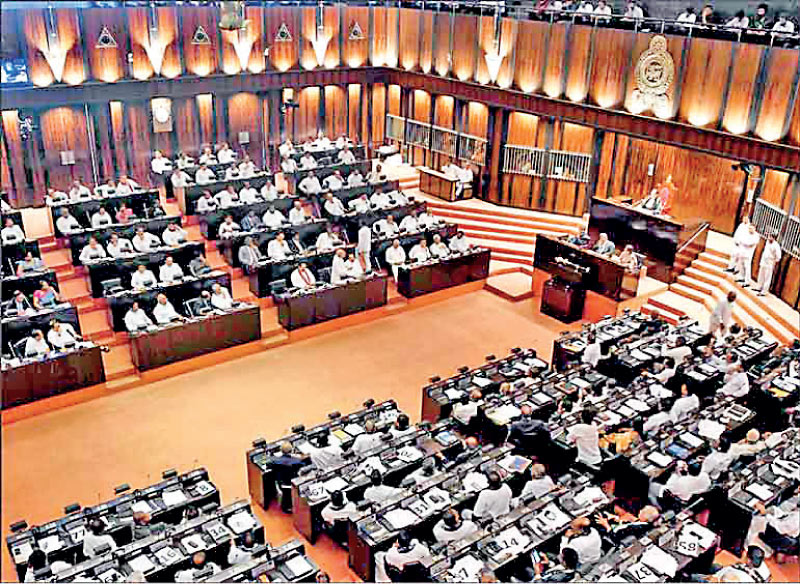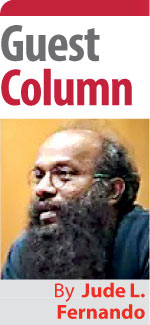Friday Feb 20, 2026
Friday Feb 20, 2026
Thursday, 3 October 2024 00:00 - - {{hitsCtrl.values.hits}}

Parliament in session: A transparent and democratic approach to public service appointments, highlighting the need for public hearings to ensure accountability and integrity
|
 The National People’s Power (NPP) Government inherited an administrative appointment system steeped in nepotism, political loyalty, corruption, and social status markers like caste and race, which often prioritised feudal-like allegiance over expertise, honesty, and integrity.
The National People’s Power (NPP) Government inherited an administrative appointment system steeped in nepotism, political loyalty, corruption, and social status markers like caste and race, which often prioritised feudal-like allegiance over expertise, honesty, and integrity.
This deeply entrenched legacy, upon which the political power of previous regimes rests, presents a daunting challenge for the NPP to advance its ‘system change’ agenda, especially during the critical transition period.
Complicating matters, none of the political parties vying for power in the upcoming general elections show signs of a radical departure from this entrenched toxic political culture. Building people’s power is essential to dismantle this entrenched system, paving the way for a new ethos committed to sustainable social and ecological justice within public administration. In navigating these turbulent waters, the NPP must judiciously manage continuing and new appointments to important positions to maintain the regime’s stability while ambitiously pursuing reforms and fulfilling its promises in the face of resistance to likely disruptions. For this purpose, Open Public hearings, widely regarded as a cornerstone of democratic engagement in many democracies, promise to be the tool that would finally facilitate ‘the New National Awakening’— the concept that captures the essence of the NPP’s mission.
Public hearings are vital tools in administrative governance, providing a formal mechanism for the public to scrutinise the transparency and efficacy of appointments. According to John Rohr in To Run a Constitution: The Legitimacy of the Administrative State (1986), ‘public hearings in the context of administrative appointments serve to ensure that such appointments are not only made in the best interest of the public but also adhere to principles of meritocracy, fairness, and openness, reflecting the democratic ethos of society.’ Typically, these hearings involve a public announcement of the proposed nominations, presentations by the nominees, opportunities for the public to respond, and a review period during which the authorities consider the feedback in light of national interests before finalising appointments.
Benefits:
Typical Process for Public hearings:
1. Nomination and announcement: The Government should nominate candidates for critical positions and publicly announce these nominations, providing comprehensive details of each candidate’s professional history, credentials, and relevant personal information. The Government should ensure race and gender equity in nominations and promote a diverse and inclusive pool of candidates. This transparency fosters public trust and allows citizens to assess nominees’ qualifications against the position’s needs. Detailed disclosure helps prevent conflicts of interest and ensures that nominees’ backgrounds are thoroughly vetted and publicly scrutinised, contributing to a more informed and engaged citizenry. To ensure accessibility for all, this information should be published across multiple media platforms and available in Sinhala, Tamil, and English.
2. Public Feedback:
Provide sufficient time, resources, and safe spaces to encourage the public to voice their opinions.
3. Appearing in Parliament as part of the Public hearing process:
An integral component of the public hearing process is the requirement for nominees to appear before Parliament. This step ensures that nominees are subjected to a detailed examination of their qualifications, intentions, and strategies in an evident and accountable setting. During these sessions, Parliamentarians engage directly with the nominees, asking probing questions that assess their readiness and suitability for the role. This Parliamentary scrutiny provides an essential layer of transparency and accountability, allowing elected representatives to safeguard the interests of their constituents. It compels nominees to publicly articulate their vision and defend their qualifications, which helps evaluate their compatibility with the role and clarifies their stances on pertinent issues. Furthermore, this process can expose inconsistencies between the nominees’ stated goals and their previous actions or statements, ensuring a more thorough and informed decision-making process. Incorporating appearances in Parliament as part of the public hearings deepens democratic oversight and enhances public trust in the Government’s administrative appointments.
4. Review and consideration:
After the feedback period, a review committee should carefully evaluate all comments and concerns about the nominees, scrutinising the legal aspects of the appointments. Public input should be integrated into the final decision-making process to ensure all voices are considered before making final appointments.
5. Final decision and public announcement:
Once the decisions are made, they should be transparently communicated to the public, explaining how the feedback influenced the final selections. This transparency validates the public’s role in governance and reinforces trust in the process.
Finally, public hearings are not free from risks and challenges, as John Adams cautions: “Democracy never lasts long. It commits suicide.” This warning echoes a genuine concern: hearings can devolve into arenas for political manoeuvring rather than forums for objective scrutiny. In politically charged environments, such debates might be exploited to discredit nominees based on partisan biases, ignoring their qualifications and merit. Furthermore, the exposure to undue public pressure or unfair criticism could deter highly qualified candidates from stepping forward to serve in public roles.
Another risk is that hearings may devolve into populist spectacles, where emotional or uninformed opinions overshadow rational, evidence-based evaluations. This can severely undermine the integrity of the process and result in decisions more swayed by public sentiment than by careful consideration of a nominee’s expertise and suitability. Moreover, the process could become burdensome and time-consuming, delaying critical appointments and impeding Government operations. Excessive scrutiny or prolonged feedback may hamper swift decision-making, diminishing administrative efficiency, especially in urgent situations.
Lastly, public hearings could unintentionally marginalise certain voices. Less vocal individuals or those lacking resources to participate might be overshadowed by more dominant groups, skewing public opinion and undermining the benefits of public hearings. Yet, these challenges are not justifications to abandon democratic processes. ‘Success is not final, failure is not fatal: It is the courage to continue that count,’ famously said Winston Churchill.
(The author is an interdisciplinary social scientist teaching at the Department of Sustainability and Social Justice at Clark University, Worcester, MA, USA. His research and teaching focus on economic development, agroecology and health issues in South Asia and Haiti).